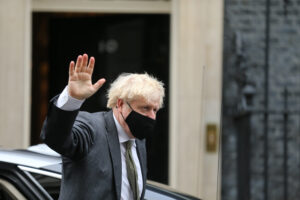
Ministers want to lift working-from-home guidance at the end of the month amid concern about the economic damage the measure is causing.
The prime minister said last week that he hoped Britain would return to something “much closer to normality” by then. The current restrictions, known as Plan B, expire on January 26 and will be reviewed in a fortnight by ministers. The measures include guidance to work from home where possible, plus a requirement for masks in indoor settings and vaccine passports for large events.
Ministers are increasingly optimistic after the number of coronavirus cases fell to 142,224 yesterday, down 10 per cent on last week. Michael Gove, the levelling-up secretary and one of the most hawkish advocates of lockdown restrictions, said yesterday the country had to learn to live with Covid-19.
Boris Johnson is being urged to prioritise ending work-from-home guidance in an effort to boost economic growth. However, scientists believe that the measure is one of the most effective interventions in reducing the spread of coronavirus.
One cabinet minister said: “The scientific voices seem to be becoming less doom-laden. If we have to keep wearing facemasks for a bit, then I’m fine with that — ending work-from-home guidance is the important one. It will help get the economy firing.”
A government source said that while ending Covid passports might be a priority for Tory MPs after the mass rebellion they provoked, the measure is less contentious with the wider public.
“Departments care far more about people going into work than vaccine passports,” the source said.
Gove said yesterday that while he himself had been at the “more cautious end” of government discussions, Johnson had been right to overrule him on the introduction of further measures.
“His judgment has been vindicated,” Gove told BBC Radio 4’s Today. “He argued publicly that we would be able to get through this with the booster campaign.”
Gove said that “for the next two or three weeks, perhaps longer”, the focus would be on dealing with pressure on the NHS, but added that there would be “better times ahead” beyond that.
“One of the things that we do need to think about is how we live with Covid, how we live with this particular type of coronavirus,” he said.
“There are other coronaviruses which are endemic and with which we live. Viruses tend to develop in a way whereby they become less harmful but more widespread. So, guided by the science, we can look to the progressive lifting of restrictions, and I think for all of us, the sooner the better. But we’ve got to keep the NHS safe.”
Ministers are privately discussing ending free lateral flow tests but Johnson insisted yesterday that the government will continue to make them available “for as long as is necessary”.
“The other line of defence in addition to testing is, of course, getting vaccinated,” the prime minister said during a visit to a clinic in his Uxbridge constituency. “The boosters are going well. We have now done 36 million boosters — 90 per cent of people over 50 — but clearly there is an opportunity for people who have not been boosted.”
Mark Harper, a Tory MP and leading critic of lockdown measures, called on Johnson to declare an end to restrictions. He said that if the prime minister tried to extend them, he would suffer an even greater rebellion than when he introduced his Plan B measures.
The prime minister’s official spokesman said that it was “too early to say” when the transition from pandemic to endemic will be complete.
“We are seeing early signs of cases falling in England, and indeed, even hospital admissions are starting to fall, but it’s still too early to draw conclusions,” the spokesman said. He stressed that hundreds of millions of lateral flow tests were being sent out this month.
“There’s no doubt that the use of lateral flow devices are both interrupting chains of transmission and saving lives,’ the spokesman said. “We’ve got 425 million tests coming on in January.”
The spokesman said that the government’s Covid autumn and winter plan had set out that “at a later stage, as the government’s response to the virus changes, universal free provision of these tests will end, and I think that’s what the public would expect”.
However, he said that it was “too early to say specifically when we will have moved from the point where we’ve got extremely high prevalence currently, and when it will be right to consider a different approach”. He added: “It’s right that we adapt along with the virus.”
Read more:
End working from home to fire up economy, ministers urge Boris Johnson
